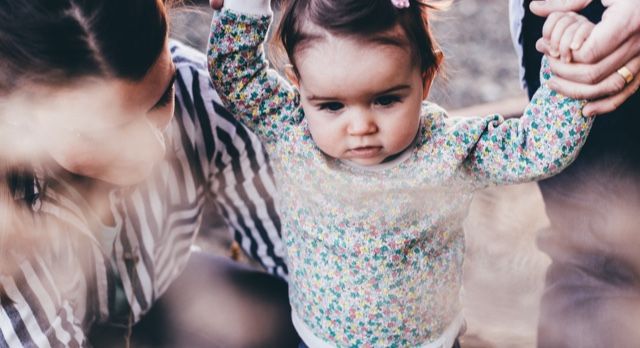
9 Things I Learned About Parenting From Comic Books
Do you have or want a child? Then take my advice: read some comic books. I’ve found comic books to be far better parenting guides than any actual parenting books I’ve read (with the exception of Act Natural, which isn’t so much of a guide as a cultural history). And guess what? As a parent, you’ll find comic books much easier to finish than just about anything else. Say goodbye to long, uninterrupted reading time.
Comics have a wealth of wisdom despite or maybe because of their brevity of prose. Here are nine such examples of things I’ve learned from comic books.
#1 Doctors Don’t Tell You Everything
 Kid Gloves by Lucy Knisley
Kid Gloves by Lucy Knisley
My OB lied to me, and I didn’t realize until reading Kid Gloves.
This graphic memoir begins with Lucy Knisley’s difficult experience conceiving and then her subsequent pregnancy and traumatic birth of her son. Somehow, she manages to bring humor to her trauma, and I so enjoyed the science bits she includes between each chapter. During her pregnancy, Knisley started experiencing complications, but her OB refused to take her complaints seriously. It turns out she had preeclampsia and almost died after giving birth because of a lack of medical care.
Knisley uses her experience to explain some of the science behind preeclampsia, and it was only then that I realized I too had preeclampsia. FYI, temporary blindness is a sign of preeclampsia. I showed other signs as well, and had a family history of preeclampsia, but that’s the symptom I wish my OB had explained. Every time my vision blurred and then disappeared into murky, crystallized light, my OB stayed by my side until it returned, even leaving a hockey game one night to make sure I was okay. She’s the kind of doctor that doesn’t worry pregnant patients unnecessarily, and I guess she’d decided I didn’t need to know since I was having a c-section for other medical complications already. But I’m the kind of person that likes to know what’s going on with my body.
Still, I’m thankful I had a doctor that was on top of my health and wellbeing, unlike Knisley’s.
#2 I’m Not The Only One
 Dear Scarlet by Teresa Wong
Dear Scarlet by Teresa Wong
In Dear Scarlet, Teresa Wong describes her struggles with postpartum depression. Though I very much wanted my daughter, after her birth, I too had PPD, and guilt and sadness plagued me for almost the entire year following her birth. I didn’t understand that you could want absolutely nothing to change in your life and still be cripplingly depressed. Wong describes this same, though also quite different, experience. Every experience with PPD is unique, and yet there’s a solidarity in knowing I’m not the only one, and it also makes it easier to seek help.
#3 It Takes A Community To Raise A Child
 Aya of Yop City by Marguerite Abouet and Clément Oubrerie
Aya of Yop City by Marguerite Abouet and Clément Oubrerie
I am so jealous of how much help new single mother Adjoua has in Aya of Yop City! Though she does take advantage of Aya’s willingness to help a little too frequently, and Bintou could be there more. I love stories of female friendship, especially in terms of helping to raise children. As an introvert, it never bothered me before how people tend to live separately in the United States—until having a child. Now I see it would be such a relief to be able to hand off my toddler sometimes and take a break.
#4 Be Prepared To Answer Really Difficult Questions
 Good Talk by Mira Jacob
Good Talk by Mira Jacob
Especially if you don’t know the answers. Mira Jacob’s son in Good Talk asks the best and most difficult questions: “Is it bad to be brown?” “Are white people afraid of brown people?” “Can Indians be racist?” “Who taught Michael Jackson to dance?”
One of the reasons I love being around children is their absolute honesty. With kids, there’s no holding back. My daughter is not at the questioning stage yet (unless you count chanting pickle pickle pickle and making grabby motions toward the kitchen), but I’m nervously looking forward to the moment she asks me something I can’t immediately answer. I hope we can learn and explore the world together just as Jacob does, using her son’s questions as a springboard to explore her own past as an Indian immigrant and to rail at the current administration.
#5 Even If I’m An Excellent Parent, I Can’t Protect My Children From Everything
 They Called Us Enemy by George Takei, Justin Eisinger, Steven Scott, and Harmony Becker
They Called Us Enemy by George Takei, Justin Eisinger, Steven Scott, and Harmony Becker
Throughout George Takei’s memoir of being imprisoned as a child in Japanese American internment camps, I was impressed by how calm and solid his parents were. They seem like such open-minded and caring people. But parents, no matter how perfect, can’t protect their children from everything. That’s especially upsetting in this graphic novel, where the government meant to protect its citizens is intentionally persecuting them. And especially upsetting since the United States is continuing this cruelty today. As a white parent with a white child, I know my daughter won’t experience race-based cruelty. But there are other cruelties in this world that I hope she’ll never experience, but that I also can’t protect her from.
#6 Good Kids Can Still Be Monsters, Especially In Middle School
 All’s Faire in Middle School by Victoria Jamieson
All’s Faire in Middle School by Victoria Jamieson
I love Imogene, or Impy, from this graphic novel. She is so perfect and funny and goofy and willing to learn from her mistakes. I was in such a happy place reading about her life as the daughter of Renaissance Faire parents. And then she throws her little brother’s lovey, a squirrel, into a pond where it promptly disappears. If you’re not a parent, it’s impossible to describe to you the horror this brought me. It’s literally the worst thing you can do to a child. My daughter has a fawn. Fawn is her sister, her BFF, her soulmate. If someone threw that fawn into a lake and they weren’t an immediate member of our family, I would turn into Hulk Margaret. And then to consider that my sweet little baby girl might turn into this bratty middle schooler! The horror!
#7 Sometimes The Best We Can Do Is Good Enough
 The Best We Could Do by Thi Bui
The Best We Could Do by Thi Bui
This is probably the most important advice on the list. Thi Bui’s memoir uses the birth of her first child as a catalyst for looking back at her own parents and their immigration from Vietnam during the Vietnam War. Her parents went from being valuable members of a society to just scraping by. But it was enough. It’s always enough. What kids need is love and acceptance.
#8 But Maybe Don’t Let Them Take A Paper Route
 Paper Girls by Brian K. Vaughan, Cliff Chiang, Matthew Wilson, and Jared K. Fletcher
Paper Girls by Brian K. Vaughan, Cliff Chiang, Matthew Wilson, and Jared K. Fletcher
Whatever you do, don’t let your child take a paper route. Do you want your 12-year-old to be a chain-smoking cusser, bitter at life’s injustice, and constantly at risk of dying? Then by all means, don’t follow this advice. My kid’s going to rake yards or something. Actually, I want her to learn all about webpage design and graphics so I can just make her my personal assistant.
#9 Do Let Them Go To Summer Camp
 Lumberjanes by Noelle Stevenson, Grace Ellis, Faith Hicks, and Brooke A. Allen
Lumberjanes by Noelle Stevenson, Grace Ellis, Faith Hicks, and Brooke A. Allen
Okay, so maybe they’ll constantly be imperiled at summer camp as well, and maybe they’ll be a bit battered and bruised when they come home, but they’ll also have made the best friends ever and have had the best adventures ever. And you’ll be the winner of that nebulous and long sought after prize—FREE TIME. Picture it now, while they’re battling mythological monsters and creating bonds that will last a lifetime—if they survive—you can have an uninterrupted hour to yourself, or even the entire day! Do whatever you want to! No one is going to bother you every twenty minutes. When you finish your coffee or tea, it will still be hot. Send them to summer camp.
If you want to know more about the comic books mentioned here, read about George Takei’s activism, or comics that will leave you speechless, about listening to Good Talk on audio, or take the Lumberjanes quiz. I’m not the only one who loved Kid Gloves and Dear Scarlet or found All’s Faire in Middle School inspiring.



 Kid Gloves
Kid Gloves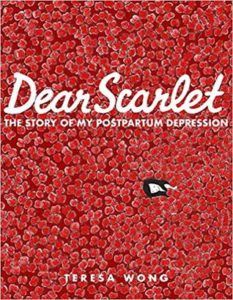 Dear Scarlet
Dear Scarlet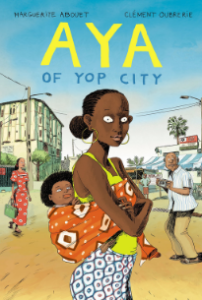 Aya of Yop City
Aya of Yop City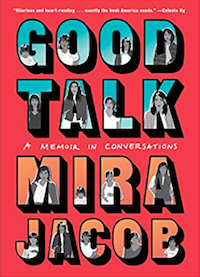 Good Talk
Good Talk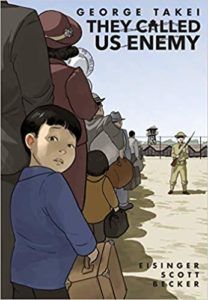 They Called Us Enemy
They Called Us Enemy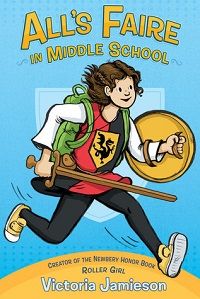 All’s Faire in Middle School
All’s Faire in Middle School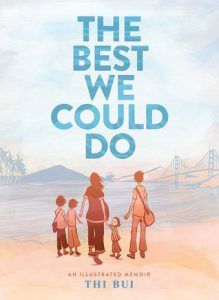 The Best We Could Do
The Best We Could Do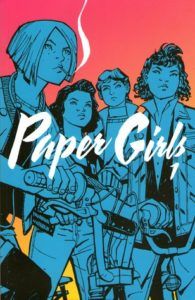 Paper Girls
Paper Girls Lumberjanes
Lumberjanes







